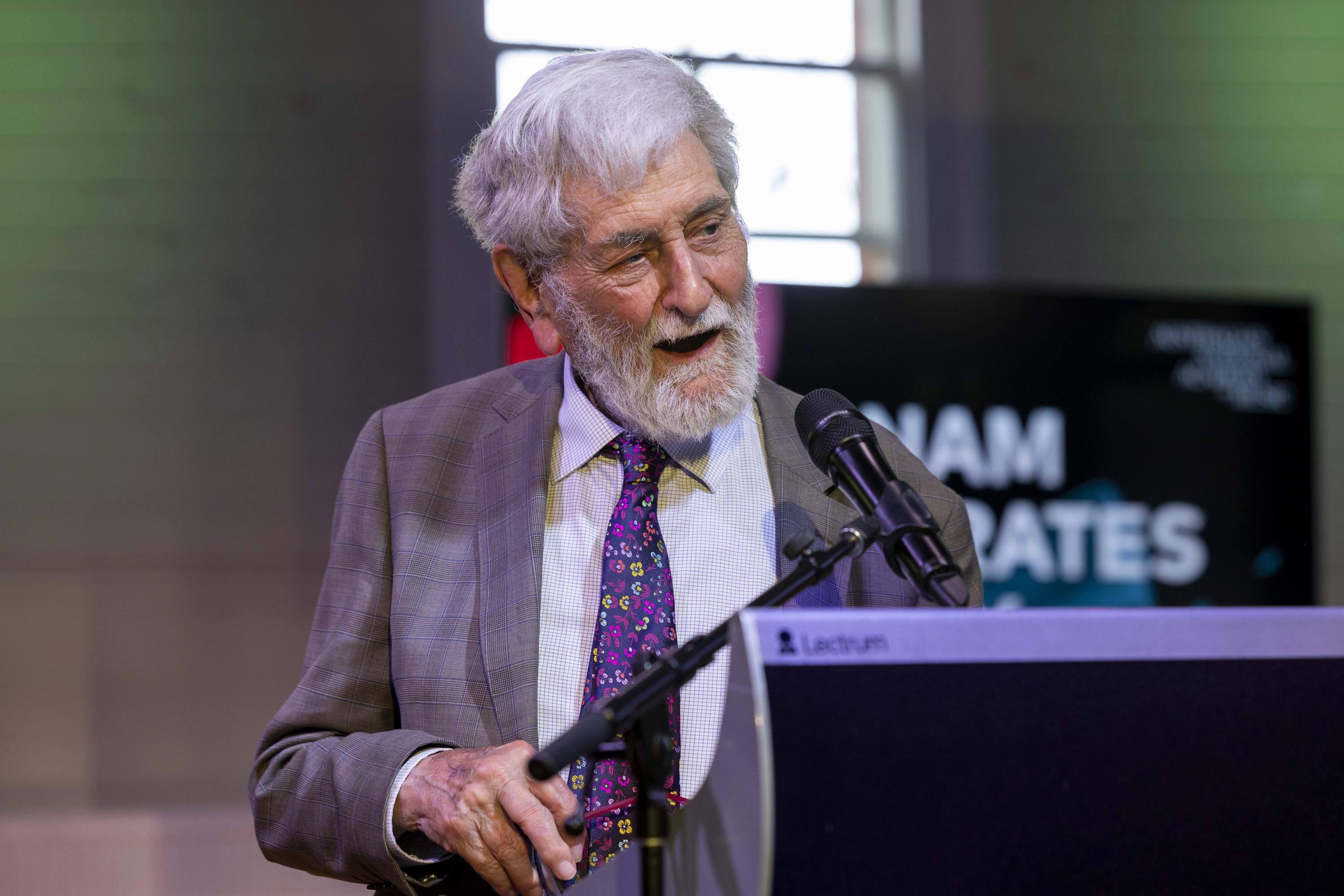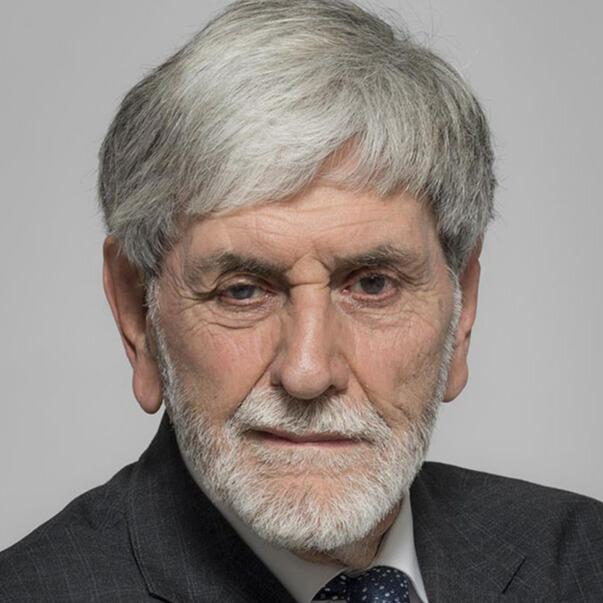On Sunday 1 December, we farewelled our 2024 departing musicians, celebrated their achievements, and announced our 2024 Award recipients. It was a day of reflection, gratitude, and quiet pride for an extraordinary year of music.
We were deeply honoured to welcome Professor The Hon Barry Jones AC, who delivered a stirring address to our departing musicians. At 92, Barry remains a tireless advocate, thinker, and a familiar face at ANAM concerts. A former Science Minister, ALP President, teacher, broadcaster, and writer, he has spent a lifetime grappling with society’s most pressing questions, explored most recently in his book What is to be done? — a sobering handbook offering ideas on how to respond to that very question.
Below is the precise transcript of Barry Jones’s address at ANAM Celebrates 2024, where he reflected on the role of music in politics and society, exploring themes of connection, transcendence, and the search for meaning — thoughts that resonate deeply as we send our musicians forward into the world.
 Barry Jones adressing ANAM musicians at ANAM Celebrates 2024. Photo by Nico Keenan.
Barry Jones adressing ANAM musicians at ANAM Celebrates 2024. Photo by Nico Keenan.
Music and politics, escaping from Plato’s cave, tackling complexity and transcendence
by Barry Jones
I was delighted to have been invited to speak at ANAM Celebrates 2024.
The Australian National Academy of Music is outstanding. It ranks among the top four or five performance-based music schools in the world, working with musicians such as Simone Young, Richard Tognetti, Anthony Marwood, Gábor Takács-Nagy, Brett Dean, Paul Dean, Richard Mills, Kathryn Stott, Nick Deutsch, Diana Doherty, Howard Penny, Timothy Young, Olli Mustonen, Paavali Jumppanen, and Tippi Valve.
Music and politics
Music in Melbourne has become politically sensitive in recent months, exacerbated by deep divisions over the Middle East conflict.
In the US, the endorsement of Kamala Harris by Taylor Swift, Bruce Springsteen, Oprah Winfrey, Beyoncé, Lady Gaga and others was controversial. Despite hopes that it might influence young people to turn up to vote, it had no demonstrable impact.
‘Welcome to Country’ is a political statement. Decades ago, so was playing ‘God Save the King’ before concerts and at the end of films.
But music has had a long history of involvement in belief systems — especially religion and politics, including nationalism—or philosophical values such as pacifism, preserving nature, and rejecting racism.
Almost all surviving masterworks in the Western tradition before the Renaissance are liturgical.
In politics, think of Beethoven, Wagner, Schoenberg, Charles Ives, Ravel, Prokofiev, Shostakovich, Aaron Copland, John Cage, John Adams, Tippett, Britten, and nationalist voices such as Chopin, Verdi, Mussorgsky, Smetana, Dvořák, Janáček, Grieg, Sibelius, Nielsen, Bartók, Kodály, de Falla, Villa-Lobos, James MacMillan, Sutherland, Sculthorpe, Deborah Cheetham, and William Barton—and, up to a point, Elgar, Debussy, and Stravinsky.
Bach was preoccupied with religion and the transcendent. Mozart was ambivalent, composing outstanding liturgical works while engaging with the religious scepticism of the 18th-century Enlightenment. Händel was a skilful political operative.
Tackling complexity – and escaping from Plato’s cave
In his famous discourse The Republic, Plato describes a darkened cave with a long entrance leading to daylight and the natural world. The cave’s inhabitants are there for life, kept in by bars, but also conditioned through habit. Shadow plays seen on the walls constitute reality to them, and they lack curiosity to explore the world outside.
The cave metaphor seems eerily prophetic in the era — first of film, then television, then computing, computer games, smartphones, and social media.
Getting out of Plato’s cave involves encouraging people to confront ‘the shock of recognition’ in unfamiliar, challenging phenomena, grasping the range of human diversity, reconciling depth of understanding with breadth of experience, and distinguishing between the macro and the micro.
Masterpieces in music, both in the Western and Eastern traditions, are characterized by extraordinary complexity, with permutations and combinations paralleling — and expanding — brain function, combining memorable tonality, rhythmic structure, and emotional power. This miracle involves labyrinthine means with a clear, unambiguous message and an inner logic.
Tackling complexity is not just a matter of taste but an essential developmental mechanism. It strengthens brain plasticity and capacity, warding off loss of cognition and the onset of dementia more effectively than computer games, Sudoku, crossword puzzles, or jigsaws.
Sometimes people say, ‘I tried music but didn’t progress past strumming a few common chords on the guitar.’ We may accept this as understandable. However, it would raise concern if people said, ‘I’ll use language but only the 500 most common words,’ or ‘I’ll use mathematics but only simple arithmetic,’ or ‘I’ll use a limited range of colours.’
Complex music involves sustained concentration and discipline—whether in performing or listening—for more than a three-minute burst (including repetition). Jazz is an anomaly, requiring virtuosity, diversity, stamina, and originality of a high order.
It is a matter of observation, confirmed by sheer numbers, that the familiar and predictable are psychologically satisfying and a vital factor in social bonding.
Contemporary tastes reflect the times, with significant group reinforcement and bonding. Each choice of music or reading is likely to be familiar or understandable to others in the age cohort. Most of the 96,000 people who attended the Taylor Swift concert in Melbourne in February — including the Prime Minister — could mouth the words of the songs, with powerful reinforcement of the familiar.
There are serious class divisions in cultural consumption, reinforced by a split-level education system. Private schools encourage performance skills and have dedicated spaces for concerts and plays. Only a handful of government schools have the resources to provide tuition in music or access to concerts.
Attempting to discuss The Iliad, Hamlet or The Marriage of Figaro proceeds on completely different bases. It is risky to assume that potential readers or listeners have any prior knowledge or emotional engagement, even after twelve years at school followed by tertiary education.
I see many people who converge in their engagement with the arts and are conscious of tensions between the role of culture and the role of civilization: they are not the same thing. There is conflict between the immediate, familiar, local, material, and self-interest, and the universal, long-term, abstract, and conceptual.
For me, of all the arts, music is the most powerful, dangerous, challenging, and exposing. It would be painful to live without it because it is my window into the mysteries of time, existence, and experience. But it leaves me vulnerable, as it elevates me to heights of emotion and understanding. I choose to live with the risk.
Approaching the arts generally — music in particular, but also literature — suggests an analogy with cathedrals and their two axes: vertical and horizontal.
The vertical pulls our gaze upward, through the vault towards the stars, reaching out for the transcendental and numinous, rapture and the unattainable; for some, Heaven. Pursuing the vertical is difficult, complex, and dangerous, involving travelling alone and coming to terms with the nameless, the aspirational, the abstract, the unique.
The horizontal is familiar, often tribal, and generally safe (leaving aside the distractions of drugs, alcohol, and sex) with shared experience.
The great challenge for us all is to find out what it is to be fully human — to explore a greater range and depth of personal experience: observation, understanding, creativity, imagination, and empathy, even for those who are remote.
High culture, with all its complexity and inevitable elitism, can take us to places where we do not expect to go. It has an aura of danger, exploring outer space or the terra (terror?) incognita of inner space. It can be life-changing, producing ‘the oceanic feeling’ and introducing us to transcendence (which I think of as orgasm without the sex).
Finale
I congratulate all award winners.
I expect that you will always remember how ANAM, with its outstanding teachers, transformed your lives.
We will follow your careers with intense interest. May you do great things!
We will never forget you.
May you never forget ANAM!
Be sure to explore ANAM's incredible 2025 season today!
